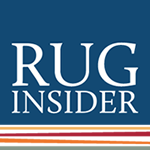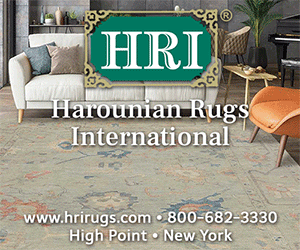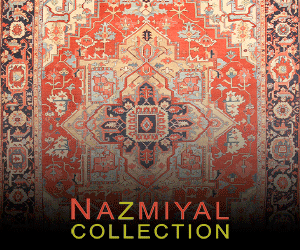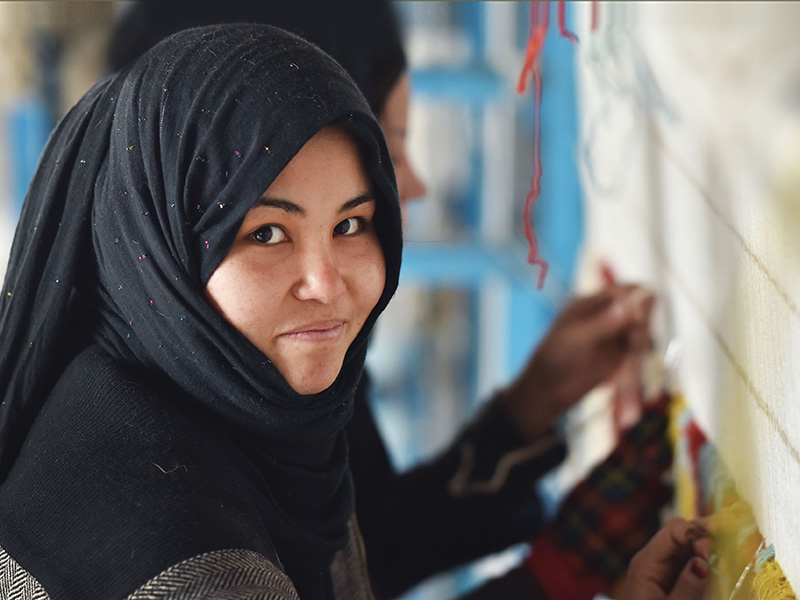A new collaborative project between the World Bank, LabelSTEP, and Turquoise Mountain seeks to empower women while simultaneously moving the Afghan carpet industry into the twenty-first century.
Turquoise Mountain is a non-profit organization founded in 2006, at the behest of His Royal Highness The Prince of Wales. Now working in Afghanistan, Myanmar, and the Middle East, Turquoise Mountain’s objective is to preserve and regenerate historic areas and communities with a rich cultural heritage and to revive traditional crafts in order to create employment, improve trade skills, and foster a renewed sense of regional and cultural pride. Its work is broad, encompassing myriad crafts and trades, from woodworking to ceramics to of course handmade carpet weaving.
Working in partnership with the World Bank and LabelSTEP, Turquoise Mountain has initiated a groundbreaking women’s empowerment project in northwestern Afghanistan that seeks to meld development, commerce, and ethical standards into a sustainable model that will serve the country for years to come. Focused on the handwoven carpet industry—Afghanistan’s second largest by value legal export commodity after agriculture—the project matches foreigners looking to produce carpets with those making carpets, while simultaneously providing training and aide to the producers. North American carpet firm Creative Matters was an early adopter of the program and will be installing a large hospitality project this fall and winter that was made possible due to the work of Turquoise Mountain.
“I feel that Afghanistan represents perhaps the last place on earth where we [as Westerners and as society broadly] have an opportunity to help sustainably develop its weaving industry, as opposed to just looking at it as a source of inexpensive labor,” said Reto Aschwanden, Managing Director of LabelSTEP, when asked about the project. Given the history of development and indeed the current state of weaving in various locales the world over, it is easy to empathize with Aschwanden’s statement, particularly considering the scale of the industry and the potential for immense positive change.
While there are approximately 1.3 million Afghans currently working in some way for the handmade carpet industry in Afghanistan, much of the value, the hard foreign currency developing countries so need, is not actually seen by the Afghans. Currently, a large percentage—well over 90%—of all carpets made in Afghanistan are exported across the porous border with Pakistan where the carpets are finished, washed, and then exported to the world market. “Afghanistan has all the things it needs to excel in the handmade carpet industry,” begins Nathalie Paarlberg, Deputy Country Director for Afghanistan for Turquoise Mountain. “Raw materials, particularly the highly regarded long-staple Ghazni wool, as well as a ready labor force with a rich tradition of weaving, to name but two. The challenge is to figure out ways to connect Afghanistan directly to international markets.”
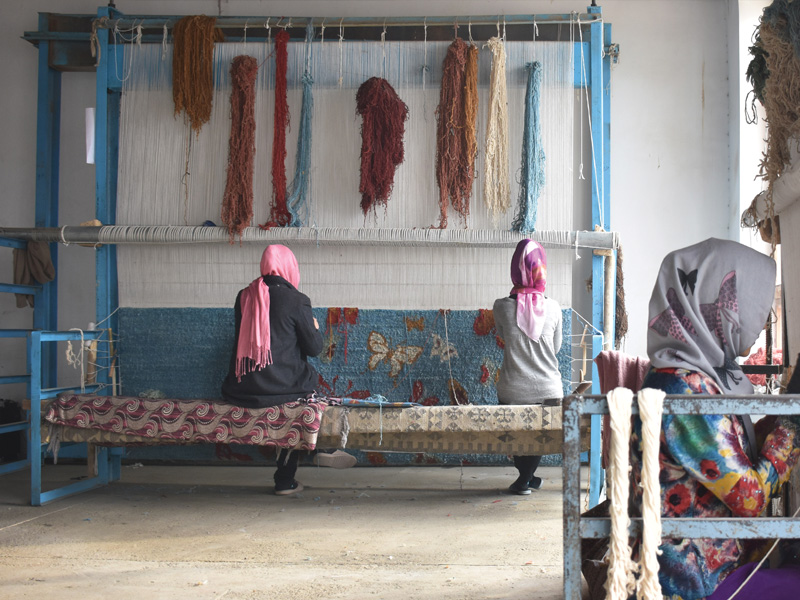
Female Afghan Weavers
Politics, religion, and a lack of stability brought about by seemingly endless conflict over the past forty years have contributed to the disaggregated nature of the industry, but cultural concerns and identity also hinder full entry of Afghanistan into the global carpet trade. With the ever more stringent and time-sensitive demands of consumers, often at odds with the aforementioned concerns, the Integrated Value Chain Model (IVCM) —as this project is called—looks for ways to provide solutions that remain sensitive to local customs. For example, the vast majority of weavers in Afghanistan are women who weave at home. If a quality control inspector comes to inspect the progress, and he’s male, he will have to meet with the male head of the household, who would then convey the information to the female weaver; one hopes, accurately. Instead, the IVCM is training women not only to be weavers, but inspectors, designers, marketers and so on throughout the management chain so the workforce can communicate more efficiently and accurately, conforming to the requirements of working at scale in a large global economy.
“Our role at Turquoise Mountain is to help build capacity for a fully integrated, wholly Afghan rug and carpet industry,” states Paarlberg. This means building finishing and washing capacity within Afghanistan so that carpets can be completely produced within the country prior to export, thus effecting a repatriation of value lost to Pakistan. “Workers in the carpet industry in Afghanistan can typically double their daily income when the carpet is made and finished entirely within the country,” according to Paarlberg.
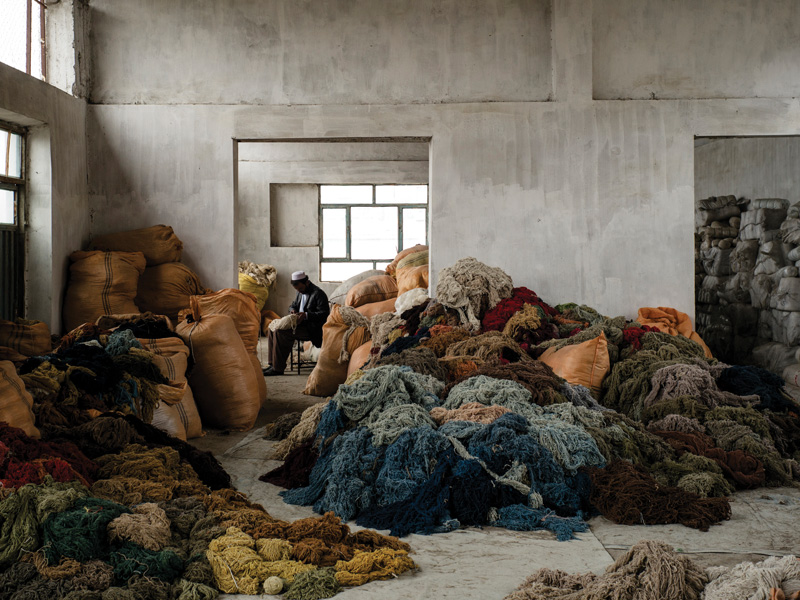
The long-staple of Ghazni wool paired with its iridescent sheen makes the fiber highly desirable for carpet making. Like any high-quality material tied to place, rugs and carpets made with Ghazni wool have an unmistakable hand.
Turquoise Mountain itself does not produce carpets. Rather it facilitates connections and acts as liaison between producers in Afghanistan and Western and international buyers. In collaboration with LabelSTEP, the agreements developed between Turquoise Mountain, buyers, and producers ensure—as best as able—that carpets are made under sustainable conditions, that fair labor practices are followed, that all rules, laws, and regulations are adhered to, and that women are empowered.
“In our experience [carpet] buyers want to source the best but have difficulties doing so, particularly in countries like Afghanistan,” again according to Paarlberg, who continues, “and if you really want to affect change—both social and developmental—you have to target large industries such as the carpet industry. Turquoise Mountain’s mission is to facilitate these interactions, which then lead to growth”. Distilled from what Paarlberg is saying is the message that development of the Afghan carpet industry cannot just focus on high-end, custom, niche specialty production, but rather it must work across the spectrum to create jobs and economic improvement for the most people—a critical component of sustainable development done the right way. One final notion expressed best by Carol Sebert, President of Creative Matters, is that what is being attempted here is a bit of a quantum leap for Afghanistan in terms of carpet making. “It’s like cell phones in the developing world. They never built out landlines and so all of a sudden everyone just had cell phones. In Afghanistan, we are trying to get the carpet industry into the now [and future] stage while skipping over the mistakes made in other countries.”
Turquoise Mountain welcomes further inquiries into the Integrated Value Chain Model, particularly from those seeking to partner with Afghan businesses to not only make carpets, but help improve the lives of those who produce them.
Images courtesy of Turquoise Mountain
